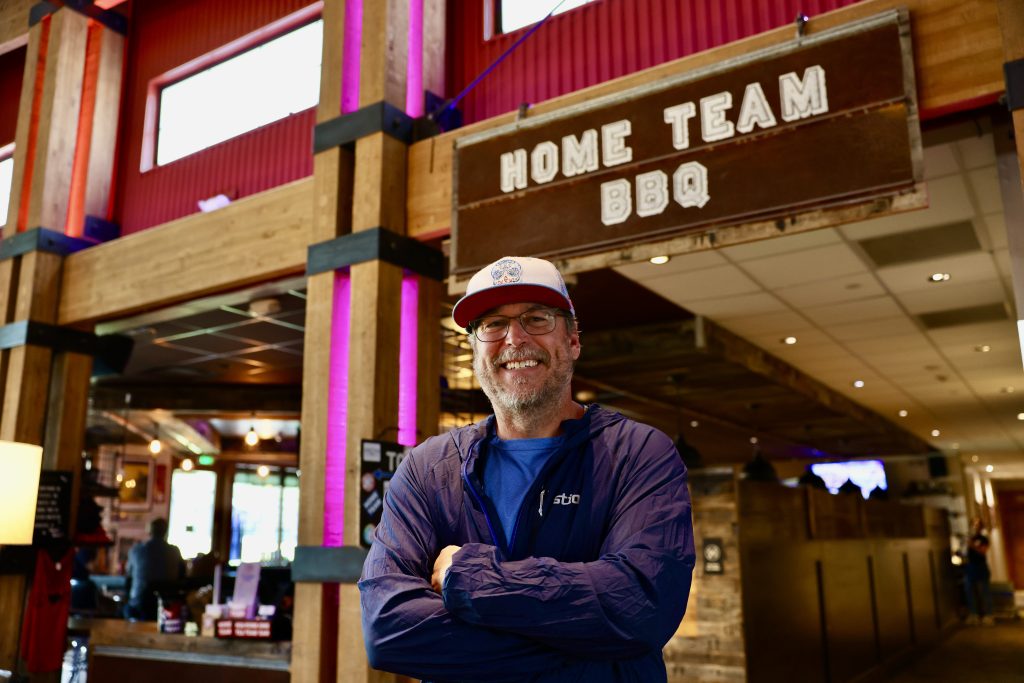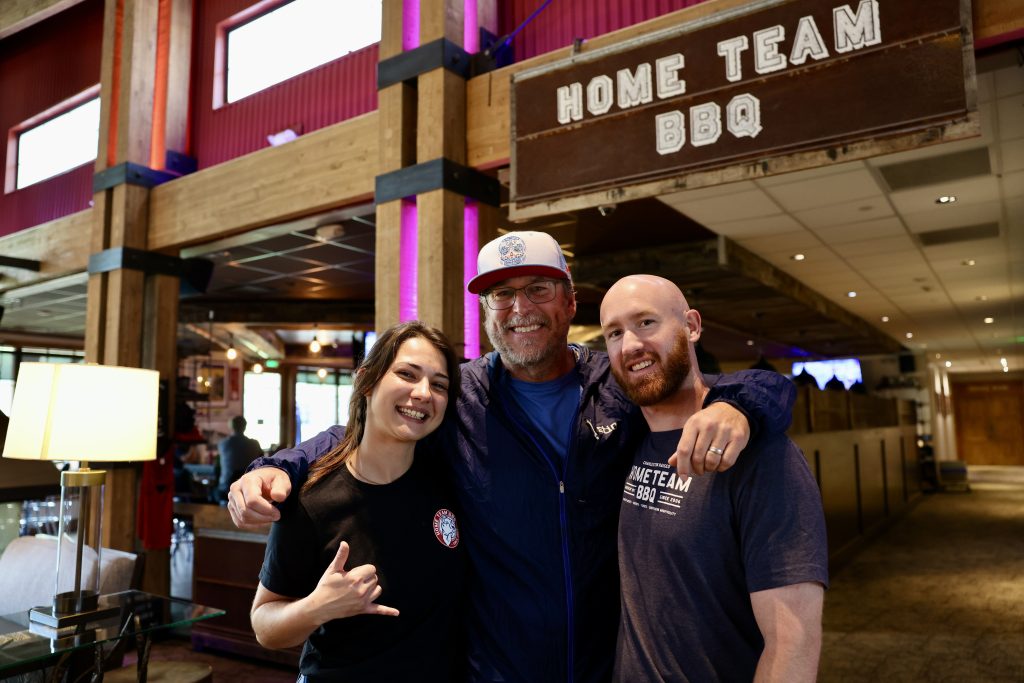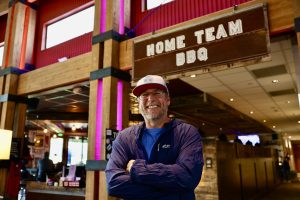Beyond the Algorithm: From foie to fire
Chris Lanter’s 28 years in Aspen’s kitchen

Courtesy photo
When Chris Lanter rolled into Aspen in 1997 with everything he owned crammed into a Honda Accord, he was headed for a pastry job at the Ritz‑Carlton and determined that cooking would be his life. He soon moved through the kitchens of Campo de Fiori and the Caribou Club before joining Cache Cache, one of Aspen’s hallmark fine‑dining institutions. First as head chef and then, two years later, becoming partners with Jodi Larner. Since then, he has become operating partner at Home Team BBQ, the low‑and‑slow spot at the base of Buttermilk, adding it to the list of institutions that have benefited from his deft hand.
We caught up with him to trace the path from dish pit to pitmaster, and to hear what keeps him in Aspen’s kitchen today.
Q: How did your life in the kitchen begin?
Chris: I was 18, fresh out of high school in Atlanta when I started working at Mellow Mushroom slinging pies. After that, I spent a year at Vanderbilt before transferring to the University of Georgia, at which point I started working at East Side DePalma’s in Athens. It was chaotic and the nights were long, but I found myself skipping classes at UGA and showing up early to shifts instead.
Q: What was your position at that time?
Chris: I was hired as a line cook but everyone had to do a stint as a dishwasher, which I loved. You really get to see how a kitchen works from the ground up. And it showed me how critical every link in the chain is in a kitchen. If the dishwashers unionized and had a strike, we’d all be screwed.
Q: Is the cinematic portrayal of working in a kitchen accurate or a bit embellished?
Chris: The hazing was real. My manager, who was my boy by the way, would fling baking trays indiscriminately in the direction of the sink. If he actually hit me, it would have probably resulted in a few stitches, but luckily I got away with just getting splashed every now and then. So yes, you need a thick skin to be in the kitchen, but everyone’s on the same team at the end of the day.
Q: Did you fall in love with the industry straight away?
Chris: In the beginning, I couldn’t even sleep; I’d close my eyes and feel like I was still on the line, working tickets in my head. It was relentless until I learned to switch it off. I realised I had to either quit or just get over it. Eventually, I came to accept the intensity as part of the job, and once I did, I started to love it.
Q: At what point did you decide, ‘This is what I want to do for a living‘?
Chris: That realization came when I was at the University of Georgia. I was a history major, drifting, and my dad had just passed away young. His best friend asked me point‑blank what I actually liked doing. The answer was clear: I kept finding myself in kitchens.
That’s when I decided to commit, and because of my French background and connections, the next logical step was to head to France.
Q: How long were you there, and what were your biggest takeaways?
Chris: I spent about 18 months in France, splitting time between Auvergne, Île‑de‑Groix, and finally a long stint in Paris at Chez Toutoune. The pace was punishing with 90‑hour weeks, but it was worth it. I learnt discipline, hierarchy, and mastered the fundamentals: knife cuts, sauces, butchery, desserts, and how to run a kitchen with precision.
Q: Who made the biggest impression on you during that time?
Chris: Working under Philippe Deschamps in Paris was one of the most formative experiences of my career. He had previously worked at a one-star Michelin restaurant, and his place was this tiny, 40-seat spot. The menu had maybe four apps, four entrees, and four desserts but I learned so much there.
Q: Any good anecdotes from your time with Philippe?
Chris: One day, I was cleaning a fish and I forgot to put it back in the fridge before joining everyone for staff lunch. When we got back and he saw the fish, he tore into me good. I’d never seen him so mad, in fact, I don’t think I’d ever heard him raise his voice before then but his discipline was scathing in this case. He was giving me these little demeaning slaps in the face with every point he was making. It stung my pride, but I never left the fish out again.
The thing I carried home with me wasn’t the slap, though, it was the ethos. I learnt that you don’t need to shout at people all day long to motivate them to do things right. He showed me that you can do it by leading by example.
Q: So, from France to Aspen. How did we get here?
Chris: After France, I went back to Atlanta during the ’96 Olympics, cooking at Panos & Paul’s, Ciboulette and Pricci. Within a year of being back home, a friend at the Ritz‑Carlton Aspen told me to come out, and that became my entry point. Pastry production there gave me my first taste of Aspen kitchens.
Q: What drew you to Cache Cache, and what convinced you to stake your claim there?
Chris: The very first time I ate at Cache Cache, I was still a sous chef at Campo and broke as could be. I went with a few buddies and one of their dads ended up covering the bill — otherwise there’s no way I could have afforded it back then.
In any case, I still remember sitting on the patio, and the vibe was something else. I had the calf’s liver, which is still on the menu today. It wasn’t fussy like some fine dining establishments where you feel like you can’t even cough without getting the side eye, but it wasn’t casual either. It struck this perfect middle ground: high‑quality food without pretension.
Q: The quality at Cache Cache is undeniable, right? What’s the secret?
Chris: Our philosophy is to spend as much time sourcing out local ingredients as we do preparing them. At Cache Cache, we really give the ingredients the opportunity to tell their story without introducing unnecessarily complicated processes.
And secondly, treat your staff well. Some of our employees have been here for decades, and to be honest, I have to extend a thanks to our clientele for that because their extraordinary gratuity goes a long way in keeping our people motivated and happy.
Q: Locals have seen quite a few places come and go at the Buttermilk venue where Home Team BBQ is now. How did you break the curse?
Chris: We looked at what was missing in the upper valley and built Home Team BBQ around that. No reservations, reasonable prices, easy parking, open for breakfast, lunch, and dinner, year‑round. It became a family spot where kids could run around, parents could relax and watch the game, and locals could grab a to‑go on the way home.
But long story short, the locals broke the curse.

Q: What advice would you give young aspiring chefs and do you think it’s still possible for independents to start something in the valley?
Chris: If you are stuck between going to culinary school and going somewhere cool and exciting and getting straight into it like I did, take the latter option. Not that there is anything wrong with culinary school.
And as far as how possible it is for young independents starting something in the valley? I have to say I don’t know, and it hurts to say it. It’s so much harder now than when I started.
Q: Still worth living here though?
Chris: Absolutely! I aim for 75 ski days a season, over 100 mountain‑bike rides, afternoons fishing the Frying Pan, and I get to do all of that without seeing another soul for the most part. To be fair, my title at Cache Cache should maybe change; I’m more of a mentor to our head chef now, so thanks to him, I get a bit more downtime. And he’s killing it, so shout out to Chef Cesar Vasquez!
From the dish pit in Athens to the fine-dining kitchens of Paris, Lanter’s career has been defined by discipline and perseverance. But it’s in Aspen where he’s made his biggest mark, building restaurants that feel like home for locals, and enduring in a town where so many independent restaurateurs get priced out.
Despite the challenges — rising rents, the shift toward corporate ownership, and the grind of running a kitchen — Lanter has doubled down on loyalty, mentorship, and making sure his spaces stay rooted in the community that surrounds us. In his eyes, the payoff isn’t just in packed dining rooms, but in empty ski runs, quiet trails, and the sense of belonging that keeps him fighting for another season.
Bryan Welker lives and breathes business and marketing in the Roaring Fork Valley and beyond. He is president, co-founder, and CRO of WDR Aspen, a boutique marketing agency that develops tailored marketing solutions. Who should we interview next? Reach out and let us know bryan@wdraspen.com.
Details released surrounding Aspen’s Castle Creek Road bike death
A 64-year-old woman was involved in a bicycle accident on Castle Creek Road that resulted in her death on Monday.









